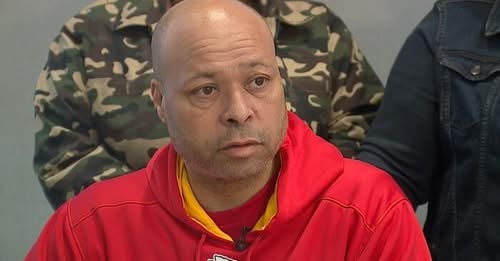Family of Denton Loudermill Jr. Plans Lawsuits Against Republican Lawmakers Following His Tragic Death After Being Misidentified as Shooter at Chiefs Parade, Sparking National Outcry Over Misinformation and Its Impact on Public Lives
April 14, 2025 — Kansas City, Missouri — The family of Denton Loudermill Jr., a man who tragically died after being misidentified as the shooter in a shooting incident during a Kansas City Chiefs victory parade, has vowed to seek justice. The incident, which unfolded amidst a chaotic public gathering, has become a symbol of the devastating effects misinformation can have on both individuals and public perception.
Loudermill, 33, was falsely accused by online figures and amplified by several Republican lawmakers who shared misleading and inflammatory statements on social media. The misidentification spread rapidly on platforms like Twitter and Facebook, leading to public shaming and harm to Loudermill’s reputation. His family is now represented by civil rights lawyers, who are planning to file lawsuits against the lawmakers responsible for perpetuating the false claims.
The Incident: A Tragic Case of Mistaken Identity
On March 27, 2025, during a Kansas City Chiefs Super Bowl victory parade, a shooting incident occurred that left several people injured, sparking panic among the thousands of fans in attendance. Police quickly responded to the scene, and a man, Denton Loudermill Jr., was caught in a crossfire and subsequently misidentified as the shooter.
Due to the public frenzy, the initial confusion led to a series of false reports, which falsely attributed the shooting to Loudermill. Several prominent figures on social media, including politicians, wrongly linked Loudermill to the crime. Within hours, posts with the hashtag #LoudermillShooter went viral, and the damage to his reputation was immediate.
Despite investigations by law enforcement that cleared Loudermill of any involvement, the misinformation about him continued to circulate for weeks. His family describes the emotional and psychological toll this has had on their loved one, leading to Loudermill suffering from anxiety, stress, and isolation. Tragically, Loudermill died in what his family claims was a preventable death linked to the mental anguish caused by the public misidentification and subsequent online attacks.
Legal Action and Lawsuits Against Republican Lawmakers
Loudermill’s family has retained prominent civil rights lawyers, including David McElroy, known for his work on cases involving online defamation and political harassment, to take action against the lawmakers involved. The lawyers have announced their intention to file defamation and emotional distress lawsuits against several Republican lawmakers who amplified the false claims about Loudermill, some of whom posted inflammatory tweets or comments despite knowing that the initial reports were unverified.
In a statement issued by the family’s legal team, McElroy said:
“What happened to Denton Loudermill Jr. is a tragedy that could have been avoided. We are now pursuing legal action against those in positions of power who knowingly spread misinformation. They used their platforms to destroy an innocent man’s life, and now they must be held accountable for the harm they’ve caused.”
The family’s legal team is focusing on specific lawmakers who publicly endorsed the false narrative, with several high-profile politicians having been named as defendants. Among them are individuals who hold key positions in state legislatures, as well as those who have a history of amplifying baseless claims for political gain.
The Impact of Misinformation on Public Lives
The misidentification of Loudermill highlights the broader societal problem of misinformation, particularly the power of social media in amplifying false narratives. Legal experts, civil rights advocates, and media commentators have all expressed grave concerns over how easily misleading stories can spread, leaving individuals vulnerable to widespread harm.
For Loudermill’s family, the emotional toll has been immense. His mother, Sandra Loudermill, said in an emotional interview:
“My son was a kind-hearted man who never hurt anyone. To see his name dragged through the mud because of lies—lies perpetuated by people who should know better—has been unbearable. We want justice, not just for Denton, but for anyone whose life has been ruined by the reckless spread of misinformation.”
Family members have also emphasized how the spread of false information by political figures directly contributed to their loved one’s demise, arguing that the harm caused by incorrect online narratives is often disproportionate to the eventual truth.
The Broader Implications for Political Discourse and Freedom of Expression
As the case gains national attention, it raises troubling questions about the intersection of misinformation, political discourse, and freedom of expression. Legal analysts note that while the First Amendment provides broad protections for free speech, there are limits when speech causes significant harm to others.
Politicians and public figures play an influential role in shaping public opinion, and many are now questioning whether misleading statements from elected officials should have more serious legal consequences when they directly harm individuals or communities.
Some experts have called for clearer legal boundaries on the issue of social media slander and defamation, particularly when political figures use their platforms to promote unverified rumors. Legal scholars argue that while free speech should be protected, responsibility must also be taken for the consequences of that speech, especially when it involves public officials.
Support for the Family and Calls for Legislative Action
The family’s fight for justice has garnered widespread support from civil rights organizations, media watchdogs, and concerned citizens who are speaking out against the role misinformation has played in the downfall of innocent lives. Social media platforms are also under increasing scrutiny for their role in allowing false content to go viral and for their failure to quickly address harmful posts.
In response to the growing demand for change, lawmakers from across the political spectrum have called for new legislation aimed at curbing misinformation and holding political figures accountable for their actions online.

